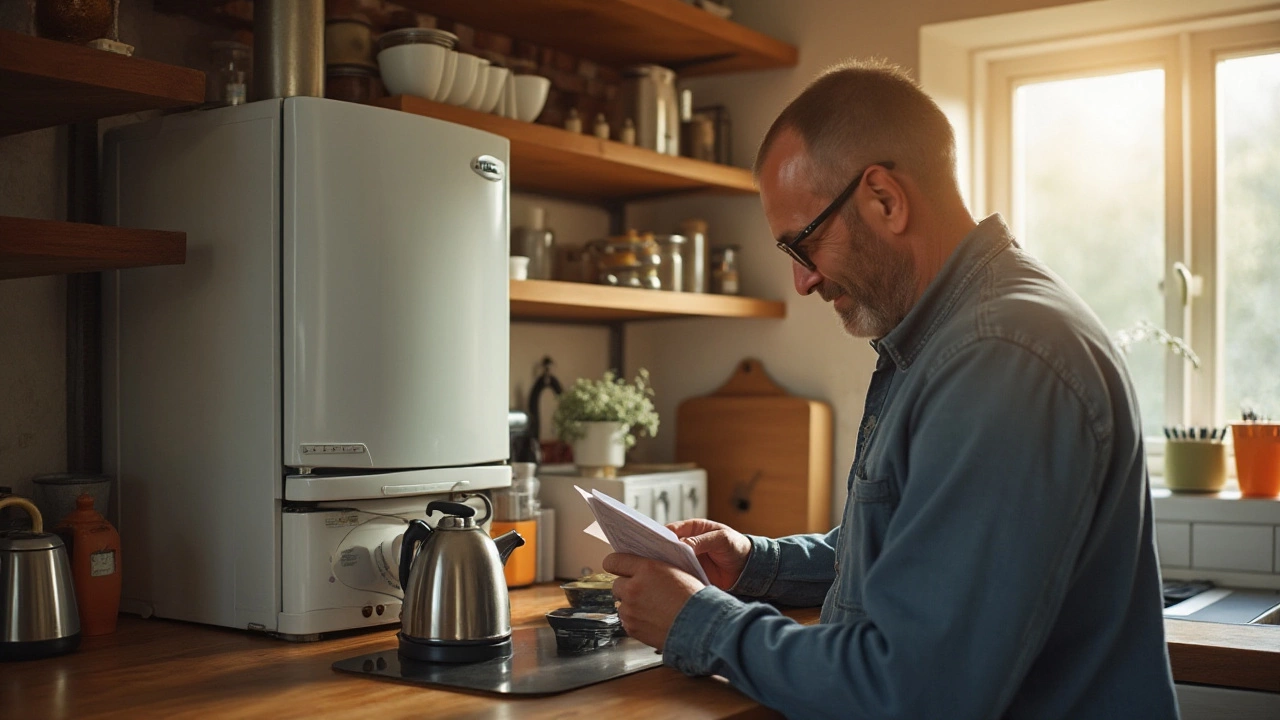In the hustle and bustle of everyday life, the convenience brought by gas appliances often goes unnoticed until something goes awry. While these household heroes quietly do their job, they also require regular attention to keep running smoothly and safely.
Understanding the importance of routine maintenance can be a game changer, not only for the lifespan of the appliance but also for the safety of your home. Regular inspections and maintenance are the key to preventing unexpected breakdowns and ensuring everything operates as it should.
Let's dive into what you need to know about how often your gas appliances should be checked, and why staying on top of maintenance can save you headaches down the road.
- Importance of Regular Gas Appliance Inspections
- Recommended Frequency for Checks
- Signs Your Gas Appliance Needs Attention
- Tips for DIY Maintenance
- When to Call a Professional
Importance of Regular Gas Appliance Inspections
Gas appliances, such as heaters, stoves, and boilers, are staples of modern homes and businesses. Their seamless operation is something many of us take for granted, yet their unchecked functioning can bring about serious risks. Regular inspections ensure not only efficiency but also the safety of your household. By understanding the importance of maintenance checks, you shield your household from potential hazards like carbon monoxide leaks, which are not only dangerous but often go unnoticed before it’s too late.
Maintaining gas appliances is akin to regular health check-ups; it's all about prevention before a costly or hazardous issue arises. A routine check could unveil a small gas leak or a malfunctioning component, preventing what could turn into a costly repair or dangerous situation. According to a study by the American Gas Association, routine maintenance can extend the life of your gas appliance by up to 20%, saving both time and money in the long haul.
Beyond safety and efficiency, there's something reassuring about having a well-oiled machine working for you. An inspection typically involves checking fuel connections, burner combustion, and ventilation. Any hiccup in these could spell inefficiency or even risk, which means understanding these checks help keep everything in track. In some cases, insurance companies may require documented regular inspections to ensure coverage remains intact. No one likes the fine print shock, so it’s worth understanding your obligations here.
Protecting Your Home, Family, and Wallet
Regular safety checks with a professional can uncover issues that a typical homeowner might miss. For instance, a faint gas smell might be something ignored, yet it can signal a leak somewhere in the system. When expert eyes are on the job, errors are much less likely to slip through the cracks. Professional inspectors often use tools that can detect leaks invisible to the human senses like specialized gas analyzers.
"Minor repairs stemming from regular inspections can prevent major catastrophes. A stitch in time saves nine," advises Dr. Linda Fossel, a renowned gas safety expert.
Finally, the peace of mind that comes from knowing your appliances are in top shape is incomparable. It's a simple yet effective way to prevent stress related to unexpected appliance failure at inopportune moments. Also, by addressing issues before they balloon, you stand to preserve the value of your home - something every homeowner can appreciate. Harnessing the power of prevention can truly transform the way your household runs.
Recommended Frequency for Checks
The importance of regularly checking your gas appliances cannot be overstated. With safety and efficiency hanging in the balance, it's vital to know just how often these checks should happen. Though specifics may vary depending on the type of appliance and usage, a general rule of thumb is to schedule a professional inspection at least once a year. This yearly check-up acts as a preventative measure against potential dangers and costly repairs. It's often suggested to pair this check with the changing seasons, such as checking heaters before winter sets in or gas grills before summer barbecue season. This ensures your appliances are ready to meet seasonal demands.
Some experts in the field, like those from the Gas Safe Register, advocate for even more frequent checks, especially if your appliances are older or if you've noticed any irregularities. Focusing on regularity rather than waiting for problems to arise can add years to your appliance's lifespan. Undertaking these inspections doesn't just uphold home safety but also maximizes energy efficiency, which can have a noticeable impact on your utility bills.
"Prevention is always safer and cheaper than cleanup," says Jane Smith, a spokesperson from Safe Energy Inc. "We encourage everyone to treat appliance maintenance as a vital household chore, much like cleaning gutters or servicing a car."
Periodic checks also help identify if any parts need replacing or if minor issues seem to be creeping up. Adhering to this schedule keeps potential hazards at bay and ensures everything is in good working order. If you're managing properties or using these appliances in a commercial setting, more frequent checks might be required. In these situations, it is wise to incorporate a hands-on monthly check by a trained staff member alongside the annual professional evaluation.
Statistics from the National Fire Protection Association shed light on the potential risks. Gas-related incidents are less common than others, but they tend to be more severe. A table summarizing common gas appliances and their typical maintenance intervals can guide owners:
| Appliance | Inspection Frequency (Minimum) |
|---|---|
| Gas Water Heater | Yearly |
| Gas Furnace | Annually, ideally before winter |
| Gas Stove/Oven | Every six months |
| Gas Fireplace | Yearly, ideally before winter |
Seasoned homeowners often have a calendar reminder set to prompt them when their appointments and inspections are due. This habit maintains household safety, prevents costly emergency call-outs, and keeps appliances performing smoothly. Remember, putting these recommendations into practice isn't just about avoiding problems. It's about ensuring your home runs like a well-oiled machine.

Signs Your Gas Appliance Needs Attention
Recognizing when your gas appliances need a little TLC can sometimes be a straightforward task, but it's occasionally deceptive. Worse, some warning signs might seem benign when, in truth, they suggest underlying issues that need prompt action. An unexpected surge in your utility bills could be a hint that an appliance is not functioning efficiently, leading to increased gas usage and costing you more over time. Unusual noises, like hissing or clunking sounds emanating from the appliance while operating, especially if they appear suddenly, should not be ignored as they can indicate mechanical issues or a gas leak.
Consider that sluggish or uneven performance in heating or cooking can also be a telltale sign. For instance, if your stove's flames are sputtering or inconsistent, it might be due to blocked burners or a more technical fault in the gas supply line. Failing to reach desired temperatures is not only frustrating but can also signal that a deeper inspection is warranted. An acute sense of smell often serves as an invaluable indicator. A persistent, unplaceable odor near the gas appliances often suggests a gas leak, even if the smell is faint. Never dismiss it lightly, as leaving such a problem unattended could escalate to dangerous levels.
Visual signs, like the color of the appliance flames, might be overlooked but are crucial. A healthy flame should be blue; a yellow or orange hue is a signal that there might not be enough air mixing with the gas, which can lead to inefficient combustion or hazardous carbon monoxide production. It's essential to respond quickly to these changes. This brings us to another critical point: investing in a carbon monoxide detector. Its alerts should prompt immediate investigation into the safety of your gas operations.
Functionality issues combined with an odd smell might lead you to suspect more serious maintenance concerns. Georgina heft, a seasoned energy efficiency advisor, once shared,
"It's key to act on the first warning. A small defect caught early can avert disasters that not only affect your budget but, more importantly, your safety."Adhering to this ethos could also include evaluating how often your appliance is needing repairs overall. If breakdowns are increasing in frequency, it might be a consistent sign that a significant overhaul or replacement is necessary.
In some households, another less obvious but equally relevant sign is a change in home events. Introduction of plant wilting when relocating them near gas equipment, or noting discomfort with a burning sensation in the eyes, could indicate faulty venting, necessitating professional intervention. Identifying and acting on these subtle yet significant signals ensures that you won't be caught off guard by potentially dangerous problems from your trusted, yet sometimes unpredictable gas appliances.
Tips for DIY Maintenance
Tackling the maintenance of your gas appliances on your own might seem daunting, but with a little guidance, it can be both manageable and rewarding. Regularly attending to your appliances not only extends their lifespan but also ensures they operate safely, efficiently, and cost-effectively. One of the first things to remember is to consult your appliance's manual. This document is a goldmine of information, providing specifics on cleaning techniques, recommended maintenance schedules, and explanations of various settings and parts. Often, we overlook these manuals, dismissing them as technical jargon best left to the experts, but they often contain clear, concise steps for basic care and troubleshooting.
A practical tip is to regularly inspect visible components. This includes checking for signs of wear and tear, rust, or any unexpected debris. The seals on your appliances are crucial; they prevent important parts from being contaminated and maintain optimal pressure levels. Ensure these seals are tight and unbroken. If they're damaged, it's wise to replace them promptly. Equally important is the ventilation. Proper ventilation ensures your gas appliance is burning fuel efficiently and reduces the risk of dangerous gas build-up within your living space. Keep vents free of dust and obstruction by giving them a routine clean.
Beyond the manual and visual inspections, cleaning is a critical part of DIY maintenance. For stovetops, this means removing grates and cleaning any spilled grime that could potentially block the gas burners. Use a mixture of baking soda and water for this task; it's gentle yet effective. Avoid abrasive materials that might damage surfaces. For other appliances like water heaters, sediment can build up over time, which can hinder efficiency. Flushing out the tank annually can keep this at bay. If you're unsure about the process, many online resources provide step-by-step guides.
"An ounce of prevention is worth a pound of cure," said Benjamin Franklin, and this adage applies aptly here. By taking small preventive steps regularly, you sidestep larger, more expensive repairs down the line.
Keep an eye on performance, as well. Changes in burner color, unusual noises, or prolonged cooking times can be signals that maintenance is due. If a stovetop burner doesn't ignite immediately or the flame appears orange instead of its usual blue, it could be a sign of blocked ports. Cleaning these with a fine brush or a needle can often resolve the issue. Details like these, though seemingly minor, can make a substantial difference in maintaining high performance standards for your gas appliances.
While DIY maintenance can handle a lot, it’s important to know your limits. Regular professional checks complement your efforts and provide a safety net against anything that might have been missed. Keeping a log of what’s been done and when can be helpful for these professional visits. They appreciate the information which can guide a more precise and thorough inspection. So, roll up your sleeves, grab your tools, and get ready to embark on this rewarding venture of ensuring your maintenance tasks are both productive and insightful.

When to Call a Professional
It's one thing to handle minor maintenance tasks on your gas appliances, but there comes a time when you should hang up your DIY gloves and call in the professionals. Knowing when this moment arrives is crucial not only for the longevity of your gas appliances but for the safety of your household. One key indicator that it's time to reach out to a skilled expert is when you notice gas leaks. If there's even a hint of a gas smell, which often resembles a rotten egg odor due to the sulfur-based compounds added for safety reasons, it's essential to immediately shut off the gas supply and contact a professional. Gas leaks are not just inconvenient; they pose significant health and safety risks, including potential explosions.
Another scenario where professional expertise is vital involves malfunctioning burners or pilot lights that won't stay lit. This could indicate a deeper issue that requires specialized tools and knowledge to fix properly. An expert will be able to assess whether these issues stem from blockages, malfunctioning components, or gas supply problems, ensuring a thorough and safe resolution. Moreover, strange noises like hissing or whistling sounds coming from your appliances often point to internal issues that are not visible and, if left unchecked, can escalate into more severe problems or system failures.
One significant yet often ignored sign that it's time to call a professional is irregular appliance performance, such as burners producing yellow flames instead of blue. This typically indicates incomplete combustion, which can lead to carbon monoxide build-up – a silent threat without a smell, taste, or color. Due to its severe health implications, having an expert assess and resolve this issue promptly is critical. If you've recently moved house or inherited an appliance and remain uncertain about its age or condition, it's wise to schedule a thorough check-up. A skilled technician can evaluate whether the appliance meets current safety standards and performs efficiently.
Additionally, should you find yourself repeatedly trying to make the same repairs or adjustments to your gas appliances without achieving lasting results, it's time for professional intervention. Consistent issues may suggest deeper systemic problems that require a trained eye to diagnose correctly. Avoid the frustration and potential risk of going in circles by bringing an expert into the mix when persistent issues arise.
Many respected guidance institutions, such as the American Gas Association, advocate for professional service not only for solving current challenges but as a preventative measure.
"Engaging professionals allows for early detection of potential hazards, maintaining both safety and performance," affirms a spokesperson from the National Fire Protection Association.Regular checks by authorized technicians can expose issues early on, preventing them from disrupting daily life or worsening into emergencies.
Keep in mind the value of professional certification in ensuring top-notch service. Accredited professionals have the training and experience to manage complex mechanical systems, keeping your home safe and your appliances running efficiently. This expert intervention, whether for emergency fixes or routine maintenance, ensures long-term care for your gas appliances, prolonging their life and safeguarding your household. Don't wait for small problems to become big predicaments; sometimes, the smartest fix is calling in a pro.
